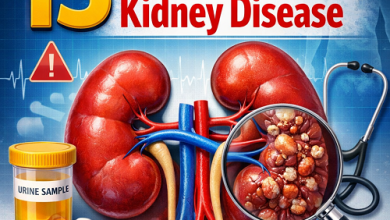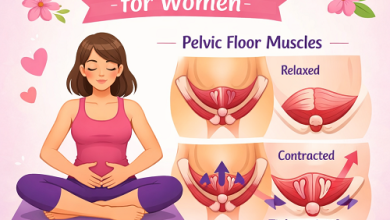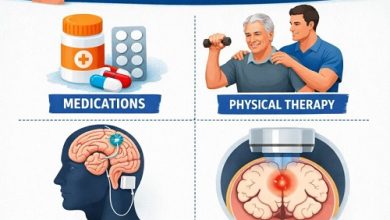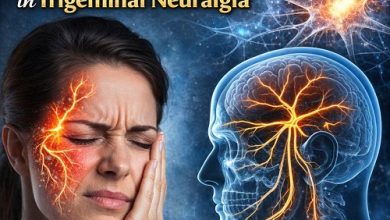Living With Epstein-Barr Virus: The Hidden Symptoms Everyone Misses

Most people have heard of the Epstein-Barr Virus (EBV), but few truly understand how deeply it can affect long-term health. While EBV is best known for causing infectious mononucleosis—commonly called “mono”—the virus doesn’t leave the body once the initial infection fades. Instead, it remains dormant, waiting for stress, illness, or immune imbalances to reactivate it.
This chronic, lingering state is where EBV becomes a quiet disruptor. Many people live with unexplained fatigue, strange pains, digestive issues, or neurological symptoms for years without realizing EBV could be a root cause. Because the virus hides inside cells and causes intermittent flares, its symptoms often mimic other health conditions.
What it truly means to live with Epstein-Barr Virus, the subtle symptoms that often go unnoticed, and how to manage life with a virus that never fully goes away.
What Is Epstein-Barr Virus? A Quiet Passenger for Life
EBV is one of the most common viruses in the world—over 90% of adults have been infected at some point. It belongs to the herpesvirus family, which includes viruses that remain in the body permanently.
After the initial infection, EBV becomes latent, hiding in your immune cells and occasionally reactivating. Not everyone feels the effects of reactivation, which is why doctors often overlook the virus as a cause of chronic symptoms.
However, in some people—especially those under chronic stress, with hormonal imbalances, autoimmune disorders, or weakened immune systems—EBV reactivation may lead to debilitating symptoms.
Why EBV Symptoms Are Often Misdiagnosed
One of the biggest challenges with EBV is that its symptoms look a lot like other conditions, such as:
- Chronic fatigue syndrome
- Fibromyalgia
- Thyroid disorders
- Lyme disease
- Depression or anxiety
- Perimenopause or hormonal imbalance
- Vitamin deficiencies
Because of this overlap, many people go years without understanding the true source of their symptoms.
Doctors frequently dismiss the possibility of chronic EBV because standard testing only shows past infection, not current activity. Specialized tests for EBV reactivation exist, but many practitioners don’t regularly use them.
This leads countless people to struggle with mysterious symptoms that never fully go away.
The Hidden Symptoms of Epstein-Barr Virus Everyone Misses
Below are the most common—and most overlooked—symptoms associated with long-term EBV or EBV reactivation. Many people experience a combination of these symptoms without connecting them to the virus.
1. Chronic, Unexplained Fatigue
EBV is notorious for causing “bone-deep” fatigue that doesn’t improve with rest. People often describe it as:
- Heavy limbs
- Brain fog
- Weakness
- Feeling drained upon waking
This fatigue is often dismissed as stress, aging, or burnout—but viral inflammation is a very real cause.
2. Persistent Sore Throat or Swollen Lymph Nodes
Even without a full infection, EBV can cause:
- Intermittent sore throat
- Swollen glands in the neck
- Tender lymph nodes under the arms
- Ear pain or fullness
These flare-ups may come and go, often triggered by stress or illness.
3. Unexplained Muscle or Joint Pain
Many people visit rheumatologists for symptoms that turn out to be EBV-related, such as:
- Deep muscle aches
- Migrating joint pain
- Lower back tightness
- Stiffness in the morning
These pains can mimic early autoimmune conditions.
4. Digestive Problems That Don’t Improve
EBV affects the immune system, which is closely tied to gut health. Hidden symptoms may include:
- Bloating
- IBS-like pain
- Nausea
- Food intolerances
- Acid reflux
- Poor appetite
EBV flares can disrupt the gut microbiome, fueling inflammation.
5. Brain Fog and Cognitive Issues
This is one of the most overlooked EBV symptoms. People report:
- Trouble concentrating
- Memory lapses
- Slow processing speed
- Feeling mentally “foggy”
These symptoms are commonly mistaken for ADHD, aging, or stress.
6. Headaches or Migraines
Chronic viral activity can trigger inflammation that leads to:
- Persistent headaches
- Migraine-like pain
- Pressure behind the eyes
Many people treat the symptoms but never identify the viral trigger.
7. Hormonal Imbalance—Especially Thyroid Issues
Studies show EBV can hide in thyroid cells, potentially contributing to:
- Hashimoto’s thyroiditis
- Hypothyroidism
- Unexplained weight gain
- Hair loss
- Sensitivity to cold
This connection is often completely missed in conventional treatment.
8. Anxiety, Mood Swings, or Depression
Chronic viral inflammation affects the nervous system, sometimes leading to:
- Sudden anxiety
- Low mood
- Irritability
- Emotional overwhelm
These symptoms may appear in cycles, coinciding with EBV reactivation.
9. Skin Issues and Rashes
Some people develop:
- Red patches
- Itchy skin
- Sudden breakouts
- Eczema-like flare-ups
These symptoms often coincide with immune activation.
10. Poor Exercise Recovery or Post-Exertional Malaise
A hallmark sign of chronic viral activity is feeling worse after exercise. This includes:
- Sudden fatigue
- Muscle pain
- Dizziness
- Flu-like symptoms
This symptom is common in chronic fatigue syndrome—which many experts believe EBV helps trigger.
What Triggers EBV Reactivation?
Even if you’ve lived with EBV for decades, certain events can “wake up” the virus:
1. Stress—physical or emotional
Chronic stress suppresses immunity, allowing EBV to activate.
2. Poor sleep or insomnia
Lack of sleep weakens the body’s ability to control viral activity.
3. Nutrient deficiencies
Low vitamin D, zinc, B vitamins, and iron can impair immune function.
4. Other illnesses
A cold, flu, or infection can give EBV an opportunity to flare.
5. Hormonal changes
Pregnancy, postpartum shifts, perimenopause, and menstruation may trigger symptoms.
6. Gut dysbiosis
A weak gut weakens your immune system—80% of immunity lives in the gut.
7. Autoimmune conditions
Existing autoimmune disorders increase EBV sensitivity.
How EBV Affects Long-Term Health
Not everyone experiences severe symptoms, but for those who do, EBV can play a role in:
- Chronic Fatigue Syndrome
- Fibromyalgia
- Autoimmune thyroid disease
- Lupus
- Multiple sclerosis
- Rheumatoid arthritis
- Certain cancers (rare but documented)
EBV doesn’t cause these conditions on its own, but it may contribute to inflammation and immune dysfunction.
How to Know If You Have Chronic EBV
Diagnosis is challenging, but not impossible. The following tests help detect EBV reactivation:
1. EBV VCA IgM
Indicates an active or recent infection.
2. EBV VCA IgG
Indicates past exposure.
3. EBV EA (Early Antigen)
Elevated levels may indicate reactivation.
4. EBV EBNA IgG
Indicates past infection; low levels may suggest reactivation.
You may also need tests for thyroid function, inflammation, and immune markers to understand the full picture.
Living With EBV: How to Manage Symptoms and Prevent Flares
There is no cure for Epstein-Barr Virus, but you can manage it successfully with the right lifestyle and wellness strategies.
1. Support Your Immune System
A strong immune system keeps EBV quiet.
Key strategies:
- Prioritize sleep
- Reduce stress
- Limit alcohol
- Quit smoking
- Stay hydrated
- Reduce sugar and processed foods
2. Adopt an Anti-Inflammatory Diet
Food plays a major role in immune balance.
Focus on:
- Leafy greens
- Berries
- Wild-caught fish
- Turmeric and ginger
- Green tea
- Garlic and onions
Avoid:
- Excess sugar
- Gluten (triggers inflammation for many)
- Processed foods
- Artificial additives
3. Support Gut Health
Because immunity starts in the gut, add:
- Probiotics
- Prebiotic fiber
- Fermented foods
- Bone broth
A healthy gut equals a calmer EBV response.
4. Use Key Supplements (With Doctor Approval)
Many find relief with natural antiviral and immune-support nutrients:
- Vitamin D
- Zinc
- Vitamin C
- B-complex
- Selenium
- Lysine
- Curcumin
- Olive leaf extract
- Monolaurin
Always consult a healthcare professional before starting supplements, especially if you’re taking medications.
5. Gentle, Restorative Movement
High-intensity exercise may worsen symptoms, but gentle movement helps:
- Walking
- Stretching
- Yoga
- Tai chi
- Light strength training
The key is consistency without overexertion.
6. Stress Management and Nervous System Reset
Stress is one of the biggest triggers for EBV reactivation.
Practice calming techniques such as:
- Deep breathing
- Meditation
- Gratitude journaling
- Nature walks
- Warm baths
- Prayer or spiritual grounding
Your nervous system directly influences your immune response.
7. Work With an EBV-Literate Practitioner
A functional medicine or integrative practitioner can help you:
- Test for EBV reactivation
- Identify root causes
- Build a treatment plan
- Balance hormones
- Address gut issues
- Reduce chronic inflammation
Tips for Living Well With Chronic EBV
Living with Epstein-Barr Virus doesn’t have to dominate your life. Many people regain full health with the right approach.
Practical tips:
- Learn your triggers
- Track your symptoms
- Prioritize rest
- Set boundaries to avoid burnout
- Practice patience—healing from EBV takes time
- Celebrate small improvements
When to Seek Medical Help
You should consult a healthcare professional if you experience:
- Persistent fatigue over 6 months
- Unexplained weight loss
- Chronic lymph node swelling
- Severe headaches or neurological symptoms
- Chest pain or breathing issues
- Worsening autoimmune symptoms
- Severe depression or anxiety
These may indicate EBV complications or unrelated health issues needing attention.
The Bottom Line: EBV Is Common—But Its Hidden Symptoms Are Not Normal
Living with Epstein-Barr Virus can be challenging, especially when the symptoms are subtle, chronic, and easily overlooked. Many people go years without understanding why they feel exhausted, inflamed, or mentally drained.
The good news?
Once you identify EBV as a potential root cause, you can take powerful steps toward recovery. Through lifestyle changes, targeted nutrition, immune support, and stress reduction, countless people manage EBV successfully and reclaim vibrant health.




